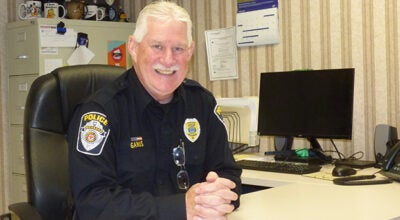‘He wishes he could take it back’
Published 11:13 pm Thursday, July 1, 2010

Dakotah Eliason, 14, is shown at a previous court hearing. He is charged with the murder of his grandfather, Jesse Miles. (File photo)
By JESSICA SIEFF
Niles Daily Star
As Steven Eliason sat across from his son Dakotah, 14, in a small interview room at the Niles Law Enforcement Complex on March 7, he couldn’t see the boy he’d woken up and spent time with almost every day of the young man’s life.
“It was my son physically,” Steven said. “But I could look in his eyes and it wasn’t. My son wasn’t there.”
With a case conference scheduled for later today, more may be learned about Dakotah’s fate. He currently faces an open murder charge in the shooting death of his grandfather, Jesse Miles.
As of right now, a trial has been scheduled for later this month. If Berrien County Prosecutor Art Cotter were to offer a plea agreement to the defense, the 14-year-old could be facing a term of years behind bars with a possibility of parole, as opposed to a life without parole sentence for first degree murder.
For Steven, as he worries for his son, the pain he feels for the loss of his father, he said has also been impacted.
“I haven’t been able to grieve properly for my dad,” he said.
Though he visits his son regularly, Steven said he is no closer to understanding what led Dakotah to commit the crime he did, he and his wife Lisa feel there could be something seriously wrong with his mental status and say nobody seems to be sharing in that concern.
Though police at the scene have testified that Dakotah stated he was not under the influence of any alcohol or narcotics, Steven said no toxicology screens were ordered after he was taken into custody.
“I feel like the prosecutor’s team and the police dropped the ball,” Steven said. “They didn’t do their job thoroughly like they should have. There are a lot of inconsistencies in what happened with this case and how it was directed.”
A video recording also revealed Dakotah alluded to Michigan State Police Det. Fabian Suarez he may have been hearing voices.
Steven said in a forensic evaluation ordered by the court, Dakotah told the psychologist questioning him that he’d been hearing voices for two years and hadn’t told anyone.
Berrien County Prosecutor Art Cotter referred to Dakotah as a “sociopath.”
A sociopath can be defined as “basically somebody who doesn’t, sort of, get the idea of social norms and doesn’t really understand the effects of what they do to people and basically has no understanding of his or her effects on people,” said Marc Zimmerman, a professor of public health and psychology at the University of Michigan.
“There’s no filter,” Zimmerman said. “They just do what they want to do without understanding or caring about social consequences… One could argue any kind of abnormal behavior is sociopathic.”
Zimmerman stresses the need to be careful in applying the term to anyone despite their age, as the risk is run to stereotype people with mental illness as being violent.
“That is a stereotype and misconception in the world,” he said. “People with mental illness are actually less violent. It’s a slippery slope.”
Either way, Zimmerman said it was not fair for someone such as a prosecutor to make such an assumption when there could be many factors or types of mental illness behind what happened in Miles’ home on Niles-Buchanan Road March 7.
“That’s a clinical diagnosis that (he) has no right making, really,” he said.
Sitting across from his son that morning, asked what was going through his mind, Steven said, “I guess, just confusion, you know? Looking for answers I know aren’t there. Like everybody, (I) asked God, ‘why?'”
Initially, he thought the shooting could have been an accident and didn’t realize reality until after viewing the recording of Dakotah’s interview with Suarez after that night.
“He never confessed to doing anything or talked to Det. Suarez about anything until I walked out of the room,” he said.
On video, Dakotah’s demeanor with Suarez could be characterized as limited emotionally, almost completely devoid of emotion at some points and at others, the boy hugs his father, wiping tears from his eyes.
Little has been said in court about the mental status of the 14-year-old and whether or not that aspect could impact the case.
Asked about the chance a 14-year-old could be diagnosed with a mental illness that could factor in to such a case, Zimmerman said illness knows no age limit.
“There’s no doubt that you can be 14 years old and have a diagnosis of a mental illness,” Zimmerman said.
Still, if that is the case, he added, “that doesn’t immune you” from punishment or from the ability to comprehend right and wrong.
“Developmentally, a 14-year-old’s brain isn’t fully developed,” he said. Though it is certainly old enough to understand that murder is not right, Zimmerman added that children that age “don’t always know the consequences of their actions, which is one reason young people take more risks than older people.”
Steven said when visiting with his son at the Berrien County Juvenile Center, while he tries not to discuss the incident too much, there is one thing about that day his son does say.
“He tells us all the time he wishes he could take it all back,” Steven said.
His son is starting to comprehend the reality of what’s going on around him, he added. In the first days and weeks, Steven said Dakotah talked about eventually being back home. Something that may likely not happen for a long, long time.
“I don’t think he knew what he did,” Lisa said.
Steven also said Dakotah is speaking with a pastor while in custody and is currently talking with another counselor who specializes in children and children who have been victims of sexual abuse.
“He’s hurting,” Lisa said.
Dakotah’s mother, Mary Apfel, who spoke out about the arrest of her son back in March did not want to comment in detail for this story but did say she reiterates her belief that what happened is not in line with her son’s personality and also said her son grew up among loving families on both sides.
The concern facing Steven now, is what could happen in regards to a sentence for his son, the fact that Dakotah could spend the rest of his life behind bars and the fear that following a conviction, his son may not get the help he might need.
“At what point do you draw the line to punish a child?” he said. “Maybe there is a chemical imbalance in his head right now and nobody knows it and nobody is doing anything about it.”
Zimmerman said the boy’s mental condition should be taken into consideration whether the case goes to trial or not.
“Things aren’t always as simple as we think they are,” he said. “As a minor with a mental illness (if that is the case), the question is, is he competent to stand trial and if that’s true (that he is not competent) is prison the appropriate outcome for him?”
For now, two sides of a family wait to see what the future holds for a boy who committed an act nobody saw coming.
“It’s like he’s just been ripped away from us,” Lisa said.
It may never be known just what was going on in Dakotah’s mind in the early morning hours of March 7. The story may never be told in court before a judge and a jury, but Dakotah’s family will be changed forever.
“I may not see my son – outside of being locked up – again in my lifetime,” Steven said.






